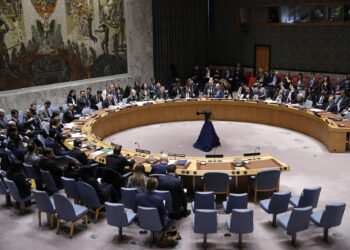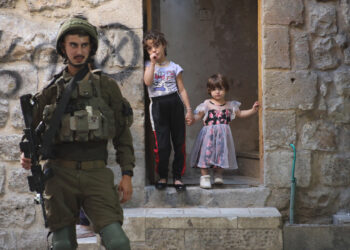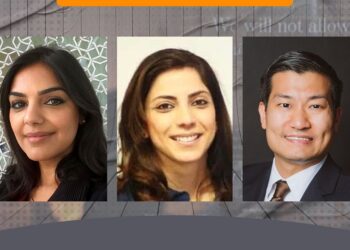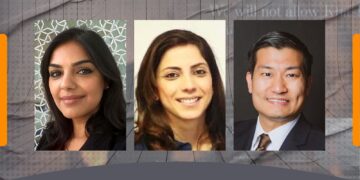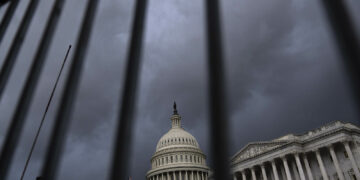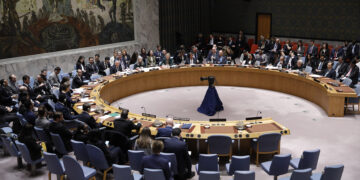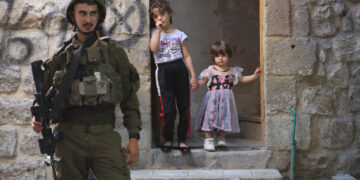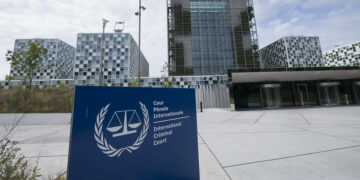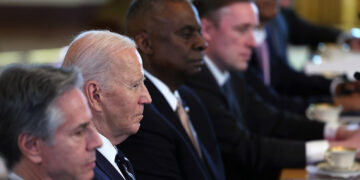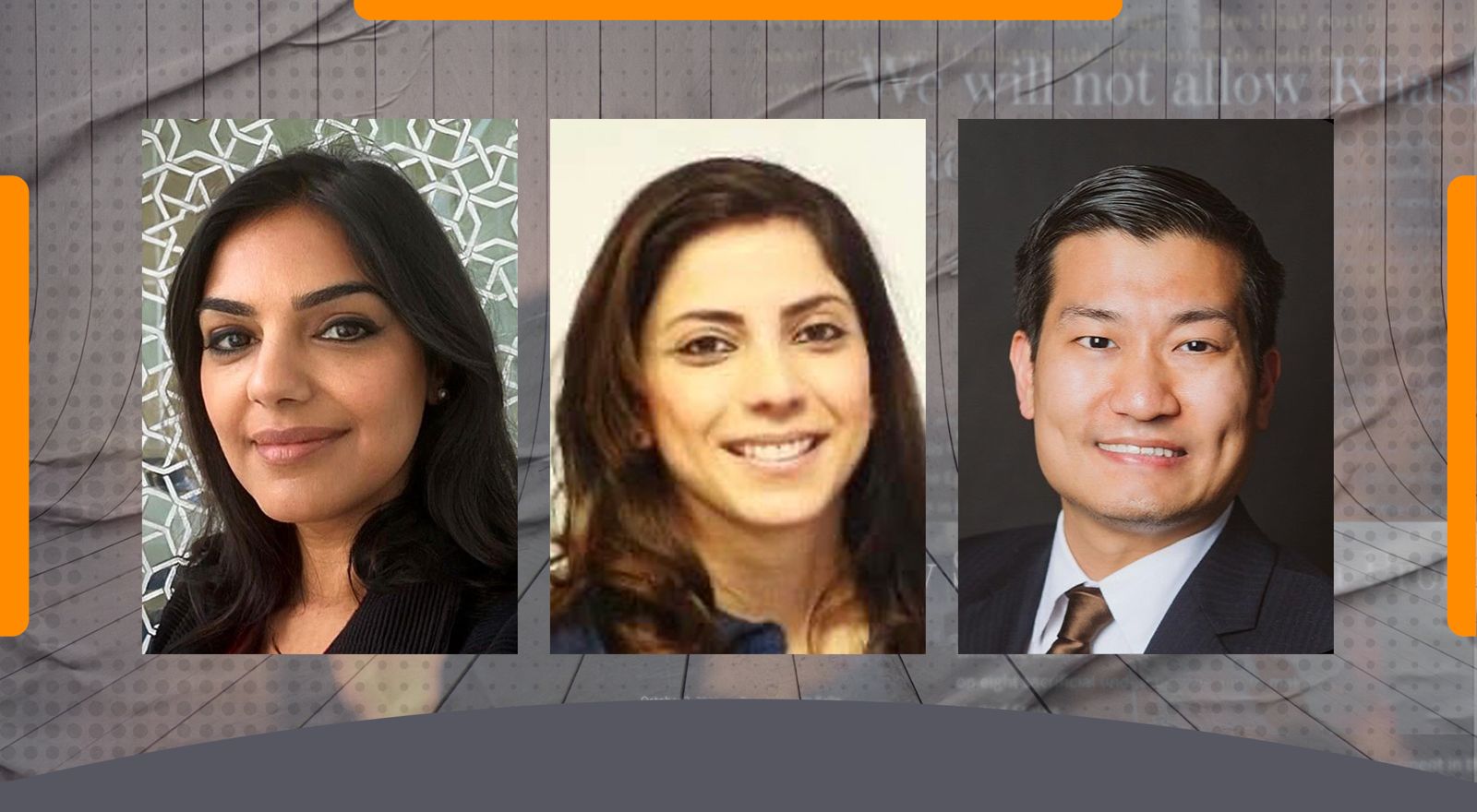New York Times Columnist Nicholas Kristof, Supreme Court Justice Sonia Sotomayor, Recognize DAWN's Contributions
(May 30, New York): Sarah Leah Whitson, Executive Director of Democracy for the Arab World Now (DAWN), received the Armenian Bar Association's "Public Servant Award" in an event at the Yale Club on May 5, 2023, said DAWN today.
New York Times columnist Nicholas Kristof presented remarks at the ceremony, recognizing the contributions of Whitson and DAWN to championing democracy and human rights in the Arab world, and pushing for reform of U.S. policy in the Middle East. Justice Sotomayor, who presented a posthumous public servant award to Peter Kougasian, also commended the work of Whitson and DAWN.
"We congratulate Sarah Leah and take great pride in her award, as well as the remarkable support and encouragement for our organization, particularly in the warm words of Justice Sotomayor and Nicholas Kristof," said Esam Omeish, acting Chairman of DAWN's board. "It is heartening to hear such powerful expressions of solidarity from one of our country's leading bar associations and most respected public figures."
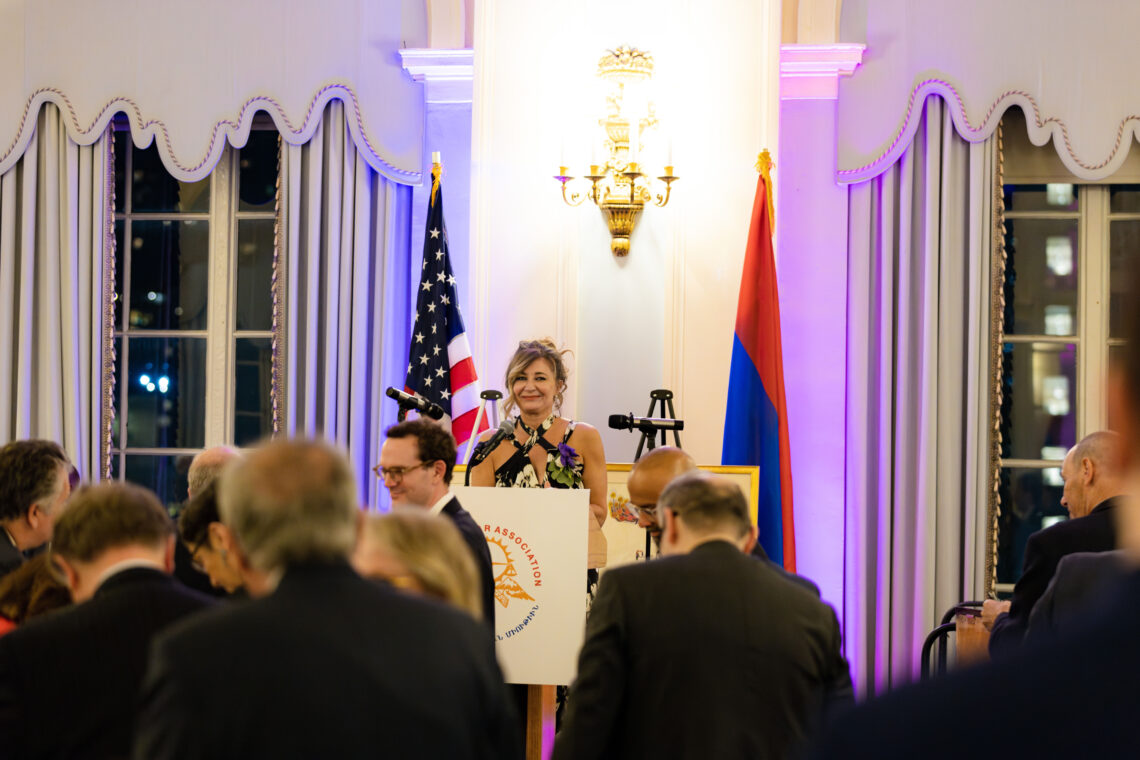
Whitson's remarks at the event described DAWN's work to the 250-person audience of lawyers, judges, prosecutors, and government officials and her own work for human rights and democracy in the Middle East since her time at Harvard Law School, starting with the first Persian Gulf War:
US policy in the Middle East remains an anomaly, really, as successive administrations, Republican and Democrat, say we support democracy and human rights and that these are critical, existential values for the U.S. and the world as authoritarianism spreads across the globe, and even as we genuinely support democracy and freedom in some parts of the world – like in Ukraine today.
But in the Middle East, our government aids and abets undemocratic governments that harm the people of the region.
We must, and can, change this. We must, and can, stop waging our endless wars, stop arming reckless, belligerent dictatorships whatever their pretend titles of emir, king, prince, and even prime minister and president, not only because it's the right and just thing to do, but because these policies undermine America's interests, and it's very legitimacy as a champion for global democracy.
Whitson warned of the encroachment of abusive Middle East governments into U.S. democratic institutions and their extraterritorial repression threatening the security of people in the U.S.:
There is now unprecedented foreign influence over our government, our policy-makers, our military leaders, and important segments of our economy that will soon dwarf the influence of domestic lobbies….This encroachment undermines the integrity and credibility of our government officials to make trustworthy foreign policy decisions, like where to send weapons or where to support wars.
And these governments are now extending their tentacles of repression into our own country, spying on, harassing, attacking activists and journalists in the US; jailing Americans who have expressed even the mildest criticism; and attacking our most precious freedom, our freedom of speech, with laws in 35 states that sanction Americans for their political views about Israel.
So what's at stake today are not just the human rights and democracy of people "over there" but the human rights and democracy of our own people over here.
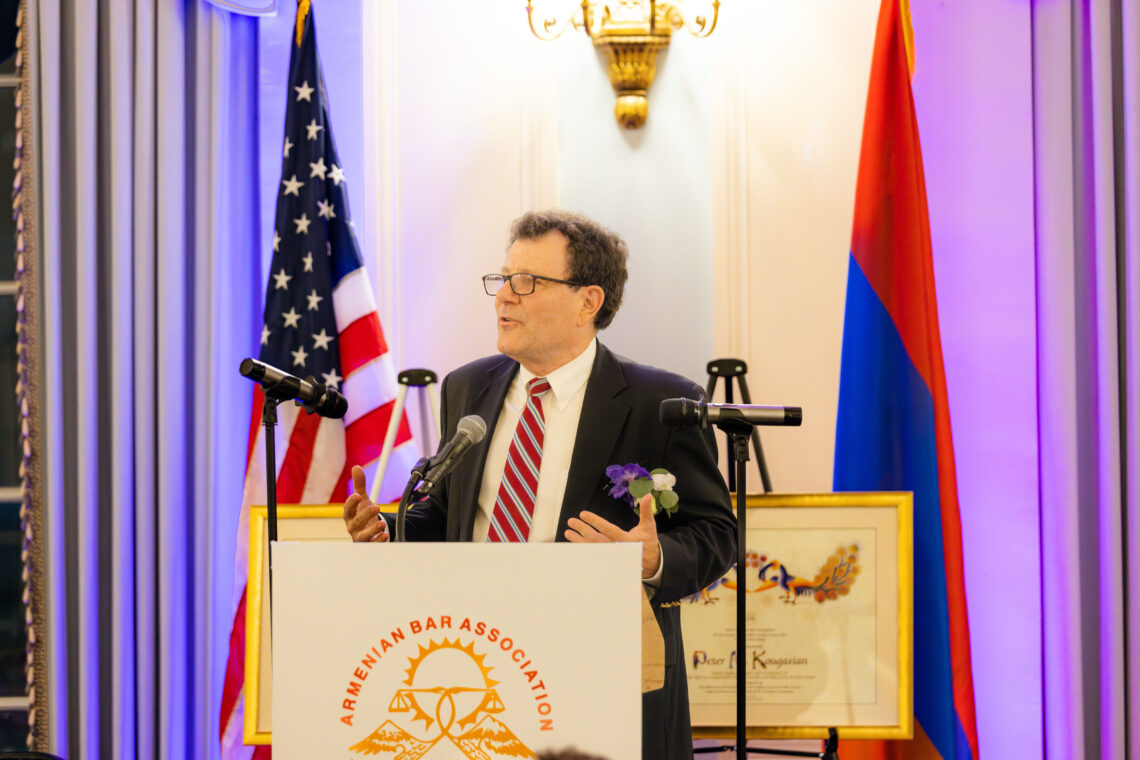
Nicholas Kristof introduced Whitson and her human rights work, noting:
After Khashoggi was murdered and dismembered, it was Sarah Leah who took up his vision and enacted it. She is now the executive director of the organization DAWN, which is working across the Middle East, against all odds, to help individuals, to advocate for democracy more broadly, and to press our own government to acknowledge the importance of human rights.
One way Armenians can honor the genocide is to speak up for other oppressed peoples. It's not just a matter of rhetoric, monuments or resolutions, but also today, in all of our human rights work, to try to do what we can to advance the human rights of others, to forge the common bonds of humanity that were denied in 2015. And that is where Sarah Leah has been a model for all of us.
The fact that we are all here tonight in this room means that all of us have truly won that lottery at birth. And when you win that lottery, a moral responsibility comes with it. I can't think of anybody that better exemplifies the ways to pay that form of responsibility forward, than Sarah Leah Whitson. Please join us in congratulating her.
Whitson has been a member of the Armenian Bar Association since its founding in 1989. Whitson, whose mother was Armenian, attended Alex Pilibos Armenian School in Los Angeles for 12 years and has been active in Armenian community affairs, including the Bar Association, the Armenian Youth Federation, and Project 2015.
***
The following is a transcript of Whitson's remarks.
Thank you. I am touched and honored by this award, as a member of the ABA association since its founding in 1989, while still a law student…
I'm honored to join the ranks of previous esteemed award winners, like my new friends Rick Hartunian and Judge Deb Karalunas and my former classmate Rod Rosenstein!
Special thanks to Souren Israelyan of the ABA, superman Souren, who created this event, and has dedicated umpteen hours to bringing it together, including our most honored guests, Justice Sotomayor and Nick Kristoff!
Souren threw down the gauntlet tonight, suggesting I speak today on how we can reinvigorate our global commitment to human rights and democracy. They have been our world's North Stars for almost a century, but today are so gravely besieged. 12 minutes! Easy!
Not only that, he's nudged me to make sure my remarks here really shine, because after all, I'm going to be followed by Justice Sotomayor?! Thanks Souren, you really built up my confidence here tonight…
We have a remarkably diverse audience here tonight: most of us probably Armenians, some immigrants from the Middle East and Armenia; some, the children of immigrants, or half (like me!) or even a quarter Armenian, who nevertheless have found themselves drawn to their roots, their identity, and the beautiful, loving community it confers on us.
We also have many "odar" (foreign) friends and family, who are here because there's at least one Armenian they love and have been impressed by, enough to attend our gathering – so thank you all for immersing yourself in our Armenian event and energy tonight.
(Oh – and as I often have to tell my older friends: the conversations you hear tonight? "We're not fighting. This is just how we talk.")
These odars include my Jewish family! including my beloved husband, Josh Zinner, who heads the ICCR (and yes, my mother always told me to marry a jew if i couldn't marry an Armenian); my children Lena (at NYU law school herself!), Tobias, and Julian; my darling niece and colleague Sophie; my mother in law and father in law John and Elizabeth Zinner, my sister in law and brother in law Lisette and Dan; my nephew Noam; and my dear friends and decades-long partners in human rights activism, Roger Normand, Mike Eisner, Chris Jochnick, Steven Donziger, and Melissa Brown. (OK so that's the Oscar's speech part of my remarks.)
There's no doubt in my mind that my Armenian identity has provided the foundation for my human rights work and political activism, because how could it not? Our history and our survival have always been a story about the human rights struggle. Growing up in Los Angeles, I was fortunate to attend an Armenian school – Alex Pilibos – for 12 years, and to belong to a very politically engaged Armenian community, where seeking justice and accountability for the crimes committed against our people were a part of our daily education. I cut my teeth on activism in the bosom of the Armenian Youth Federation.
Like so many other Armenians, I would wager every single Armenian here tonight, I grew up seeped in the aftermath of genocide: piecing together the fragmented narratives of the suffering and survival of my family: my grandfather's lone survival as an orphan in Diyarbakir – Dikranagerd; my grandmother's birth in an Armenian refugee camp in Zahleh, Lebanon; their experience, along with their six children, fleeing from one war torn Middle Eastern country to another, but surviving. We didn't really talk about any of this the way people talk about their lived experiences today; the family was too busy just surviving.
What I tell my children (over and over and over again) is that they are fortunate, privileged really, to have a slice of our ancient Armenian DNA running through their veins. It has not only bred us as survivors, but connected us to a people whose values, and heritage, and faith, and sense of humor (!), have rather miraculously carried through to this day over thousands of years, despite the odds, despite the deliberate attempts to obliterate our people.
I've come to realize that what my Armenian upbringing has instilled is not only an aspiration for truth and justice; for freedom from persecution; for dignity and reparations for the Armenian people – I do want those things – but the aspiration for these universal values for all human beings.
These are the values that have driven me to dedicate my work to fighting for human rights and democracy, and fighting against injustice, most of all when my own government is the source of injustice.
I started my human rights activism in earnest in 1991, during the first US war in Iraq (remember? The first Persian Gulf War?), together with my Harvard Law School classmates while we were still students, several of them here this evening, traveling to Iraq to investigate the impact of our country's bombardment and sanctions of the country, that led hundreds of thousands of Iraqis to die.
It's why I fought again, in 2003, against my government's second war in Iraq, its brutal invasion and shameful occupation, at a moment when our country was dizzy with bloodlust following the horrific 9/11 attacks, seeking someone, anyone, anywhere to punish.
It was this war, and the nonplussed, lazy reactions of my then Goldman Sachs colleagues to the most important decision our country could ever take, to start a war that would inevitably kill people thousands of miles away, even sacrificing the lives of our own young men, that led me to leave my corporate work and dedicate all of my time to human rights work.
So really, it's thanks to George W. Bush that I next joined Human Rights Watch, where I was privileged to spend 15 years leading our Middle East division, investigating and exposing horrendous abuses in 19 countries, living through the dramatic 2011 uprisings that gave the whole world hope that democracy would finally defeat tyranny even there, only to be followed by the tragic counter revolutions and descent into wars that continue today.
Investigating these wars and interviewing countless victims in the scarred ruins of Yemen, Iraq, Libya, Syria, Lebanon, Gaza, I have learned to cherish life and peace over much else. I hope we will remember the decades of these wars, most fueled by proxy forces, to question what Ukraine will look like even in a "best case scenario" after five more years of war.
I joined the organization I now work for, DAWN, Democracy for the Arab World Now, thanks to another war criminal, Saudi Crown Prince Mohamed bin Salman. The Saudi journalist Jamal Khashoggi, my friend, founded DAWN just a few months before the Crown Prince murdered him in 2018. Jamal and I had become friends over the years because of our work, and his murder was very personally painful to me. I will never forget the day he was murdered: I was in Beirut, speaking by phone to his fiance, Hatice Cengiz, as she stood outside the Istanbul consulate, figuring out what we should do because he hadn't emerged, and my chilling realization at that moment that he would never emerge.
DAWN's board asked me to step into Jamal's shoes, to pursue his vision, our vision, for a world where the people of the Middle East live in democratic governments, which really is the only way to secure not just rights and freedom, but peace and dignity. This is not the world they live in today. Indeed, not one country in the region is a real democracy.
But the people of this region are not fated to misery and oppression. They live under man-made tyrannies, far too many of whom rely on our own government's support.
That's why we at DAWN believe the best way we can make a difference, as an American organization, is by ending US support for abusive, authoritarian and apartheid governments in the region.
US policy in the Middle East remains an anomaly, really, as successive administrations, Republican and Democrat, say we support democracy and human rights and that these are critical, existential values for the us and the world as authoritarianism spreads across the globe, and even as we genuinely support democracy and freedom in some parts of the world – like in Ukraine today.
But in the Middle East, our government aids and abets undemocratic governments that harm the people of the region.
We must, and can, change this. We must, and can, stop waging our endless wars, stop arming reckless, belligerent dictatorships whatever their pretend titles of emir, king, prince, and even prime minister and president, not only because it's the right and just thing to do, but because these policies undermine America's interests, and it's very legitimacy as a champion for global democracy.
What may be less apparent is that our own democracy is at risk of corrosion by these abusive governments.
There is now unprecedented foreign influence over our government, our policy-makers, our military leaders, and important segments of our economy that will soon dwarf the influence of domestic lobbies. We have no serious laws that prohibit them from financing our politicians, and more significantly, from buying them off with lucrative jobs for when they leave office.
We should be appalled that over 500 former US military officials are now on the payroll of Arab Gulf governments; we should be shocked that our former president, Donald Trump, and his son-in-law Jared Kushner and Treasury Secretary Stephen Mnuchin and before them National Security Agency chief General Alexander, have cashed out with billions of dollars from the Saudi government.
This encroachment undermines the integrity and credibility of our govt officials to make trustworthy foreign policy decisions, like where to send weapons or where to support wars.
And these govts are now extending their tentacles of repression into our own country, spying on, harassing, attacking activists and journalists in the US; jailing Americans who have expressed even the mildest criticism; and attacking our most precious freedom, our freedom of speech, with laws in 35 states that sanction Americans for their political views about Israel.
So what's at stake today are not just the human rights and democracy of people "over there", but the human rights and democracy of our own people over here.
My insistence on challenging my own government's abuses, though I consider it my duty as a citizen, is perhaps why some describe my work as "controversial" or "political", which apparently is a suspect term these days, though rest assured I spare neither Democrats or Republicans from criticism.
There is indeed, however, a lot of "fight" involved to preserve human rights from governments that steal them. So it's a good thing my personality, which comes entirely from my mother, does not shy away from a good scrap!
"There's one thing you should know about me," my mother, Ashkhen, then about 60 years old, told my brother in law, Noah, who was then about 20, the very first time they met in Brooklyn. "I'm a fighter!". He wasn't sure how to respond to that.
My mother, named after one of the great queens of Armenia, had endured the plagues of the Near East: war, death, destruction, and homelessness, deprived of an education, moving from country to country, escaping one war after another, a refugee. She had seen her mother and brother murdered before her very eyes in Jordan, followed by my father's death in Los Angeles just a few months later.
But she remained a fighter, always, and taught me that we can respond to life's difficulties with sadness, tears, and hopelessness. Or we can become mad and brave and fight: fight for hope, fight for justice, and fight for our rights.
In around 1996, I was involved in bringing a claim against an Armenian govt official involved in the attacks on protesters in Yerevan. My task was to serve him with the complaint at Columbia University, where he was giving a talk before hundreds in the auditorium. Tensions were soaring, and security guards were positioned all around.
Sensing my nervousness, my mother, who had the vaguest understanding of the lawsuit, much less the Alien Tort Claims Act, grabbed the complaint from my hand, marched up to the podium where the official was speaking, and declared before the entire audience, "you are hereby served! We will see you in court!" Then she turned to me and said, "paneh me mee vakhnar aghcheegs. Menk vakh check janchnar". "Never be afraid of anything, my daughter. We have no acquaintance with fear."
It is this strength, this confidence, this certainty that we must stand for what we believe in, for our values, for our rights, for our dignity, for our freedom that I carry with me still today. Some people find belonging and security among the powerful, the rich, the successful. I've always found my own sense of belonging (if not much security!) among the vulnerable and oppressed – how could I not, as an Armenian-American?
I have found so much inspiration from the fearless activists I've become close to over the years, some of whom, too many of whom, are imprisoned today, like my dear friend Osman Kavala, the Turkish philanthropist who is now serving a life sentence in Turkey on completely fraudulent charges. We had partnered together to organize a 100 year centennial commemoration for the Armenian Genocide in Istanbul, an initiative to which 130 Armenians traveled from around the world to join the tens of thousands citizens of Turkey in 2015 to honor the victims, together.
It should be lost on no one that I and so many Armenians around the world are today fighting for an unjustly imprisoned Turk. That's what human rights mean to me.
Souren jan, you tasked me with a difficult job to consider how we can reinvigorate our global commitment to rights, how we give hope to our youth, who live in a time of such cynicism and hopelessness. We have run out of visions for utopia. It's hard to see the arc of the universe bending towards justice! We no longer ask our children to reform the world. Now we're asking them to save it.
I'm afraid the only magic answer is the sober truth we all know. It's up to us. It's up to us to fight for democracy and human rights. It's up to us to become engaged, to devote our time, our mental and emotional energy, our resources, to preserving our global human values. As Camus once wrote, "Real generosity towards the future lies in giving all to the present."
I've little certainty that we will emerge victorious, that we will cumulatively leave our planet better than we found it. But all we can do, all we must do, is struggle on, firm in our principles, never willing to surrender, never granting an inch to the despots and the brutes, giving all to our present, knowing that it is this very struggle, whatever battles we win or lose, however many wounds we gather, that preserves our humanity.
And that's the Armenian way over thousands of years, right?













